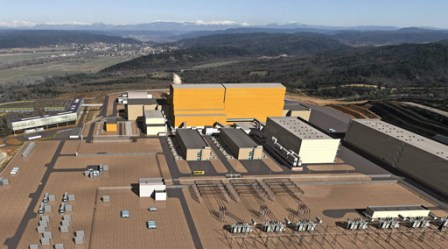Details have been released of a final funding agreement that will see the European Union (EU) financing its commitments to the Iter fusion project in France for the next two years.
 |
| How the completed Iter buildings at Cadarache could appear (Image: Iter) |
The EU Council of Ministers, the European Parliament and the European Commission have agreed where to find the €1.3 billion ($1.7 billion) needed for 2012 and 2013, with significant funds being reallocated from the EU's budgets for administration and natural resources development.
A European Commission note explained that €840 million ($1.1 billion) would come through increasing EU spending on its 'competitiveness for growth and employment' budget for 2012 by €650 million ($853 million) and for 2013 by €190 million ($249 million). This money will be generated by cutting EU budgets for promoting natural resources by €450 million ($590 million) in 2011, and by reducing administration costs in 2011 and 2012 by €390 million ($512 million).
Ministers and MEPs also agreed that another €360 million ($472 million) would be found within the EU's 2013 budget, without increasing overall expenditure. However, they did not identify which budgets will shrink as a result. Meanwhile, the final €100 million ($131 million) has already been earmarked for Iter.
Commenting on the package, EU budget Commissioner Janusz Lewandowski said: "I am relieved that the extra financial needs of Iter are now covered. The EU could not afford to lose credibility vis-à-vis its international partners involved in the project," namely the USA, Japan, South Korea, China, India and Russia.
He praised the "positive spirit shown by the representatives of both the council and the parliament." Both will have to formally approve this new spending, but this is considered a formality. The deal was brokered by the council’s outgoing Polish presidency.
A council communiqué said: "This means that additional €1.2 billion ($1.6 billion) in commitments will be made available for Iter ... This agreement allows the European Union to meet its international commitments."
The Iter fusion reactor is currently under construction at Cadarache, southern France. It is slated to be the first fusion reactor capable of producing net power. Fifty megawatts of input power should be enough to produce 500 megawatts output sustained on something closer to a steady state basis. The project has been plagued by numerous budget-related delays in its construction schedule and is now tentatively slated to achieve its first plasma by 2019.
By Keith Nuthall
for World Nuclear News




_87299.jpg)
_52351.jpg)








